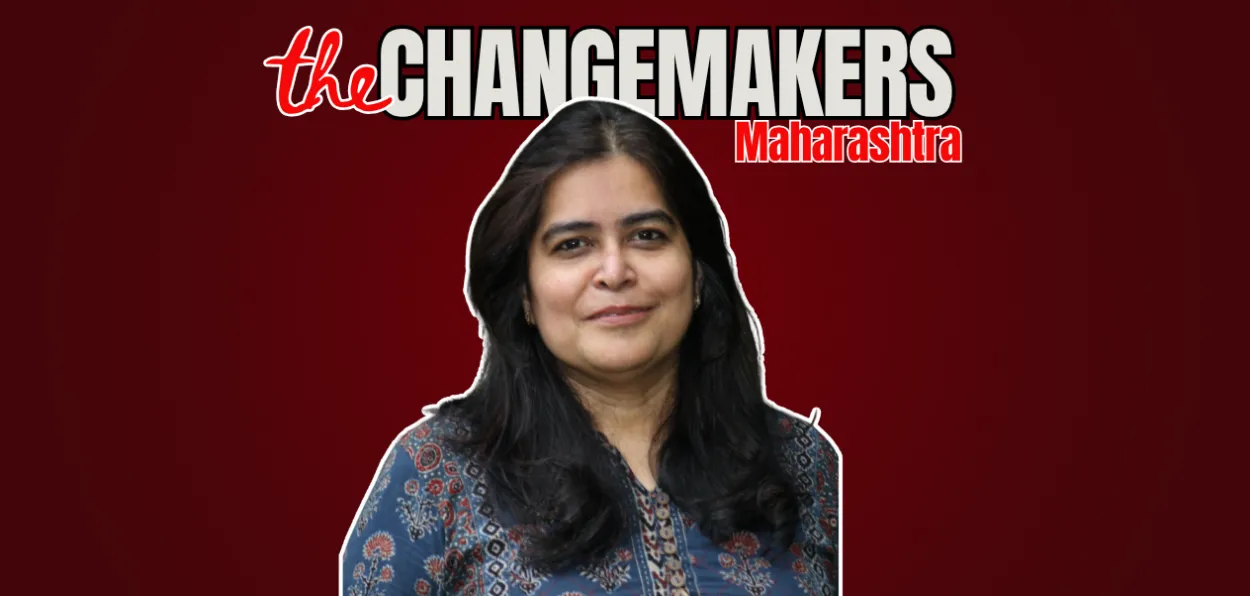
Bhakti Chalak
Sabah Khan of Mumbra, Maharashtra, chose football—a sport rarely associated with girls in conservative communities—as a tool to empower young women and build confidence.
Co-founder of the NGO Parcham, the road for this Muslim woman was anything but easy. Convincing skeptical parents, dealing with criticism about girls playing sports, and securing a dedicated practice ground were all uphill battles.
“I had built trust with the women in Mumbra,” Sabah recalls. That trust would become the foundation for transformation.
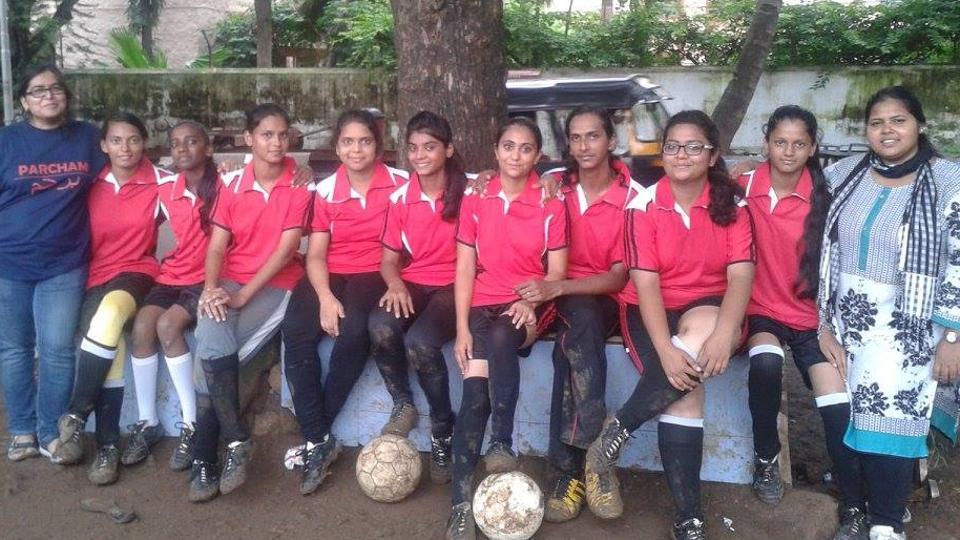
Sabah Khan with women footballers
Determined, she visited homes, patiently persuading families that football could open new doors for their daughters. Her persistence paid off. She managed to raise a Girls’ football team, but the challenge of finding a field to play on remained.
Now nearing fifty, Sabah’s impact extends far beyond sports. Her mission encompasses gender equality, education, and religious harmony, inspiring young people across Mumbai to dream beyond the boundaries society often imposes.
Sabah was born into a progressive Muslim family in Madanpura and raised in Mumbra, a predominantly Muslim neighborhood. Her parents - mother, a teacher, and father, a railway employee - prioritized education for Sabah and her three siblings.
This early emphasis on learning shaped her path. She earned a Bachelor's degree in Economics. She later pursued a Master’s in Social Work from the Tata Institute of Social Sciences—laying the groundwork for a life devoted to social activism.
Sabah’s passion for empowering women found focus in Mumbra, where she began working closely with the community. A turning point came in 2012 when she collaborated with the organization Magic Bus to offer football training for girls.
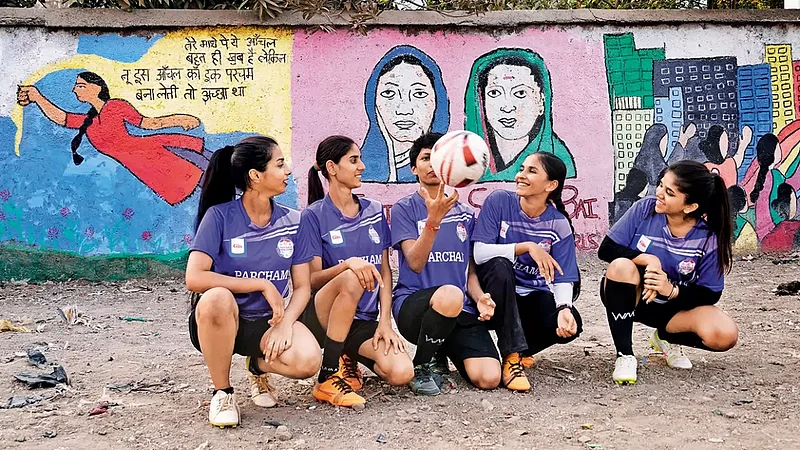
The girls of Parcham's Football team
Inspired by the girls’ enthusiasm, she formally registered Parcham as an NGO in 2013. “A friend at Magic Bus suggested starting football training. When I spoke to the girls, they were excited to join,” she told Awaz-The Voice.
To recruit players, Sabah distributed leaflets in local schools and colleges. But getting field time was a constant struggle—girls were often forced to share space with boys, leading her to launch a signature campaign demanding a dedicated ground.
The response was overwhelming: nearly 1,000 women from Mumbra signed the petition. “We submitted it to MLA Jitendra Awhad,” Sabah says. “He was surprised but supportive and helped arrange a meeting with Commissioner Aseem Gupta, who eventually allocated a field for us.”
Still, obstacles remained. “Even after a decade, the field is often used for public events, disrupting our practice,” she explains. “We approached the MLA again and are ready to protest if necessary.” Her resolve remains unshaken.
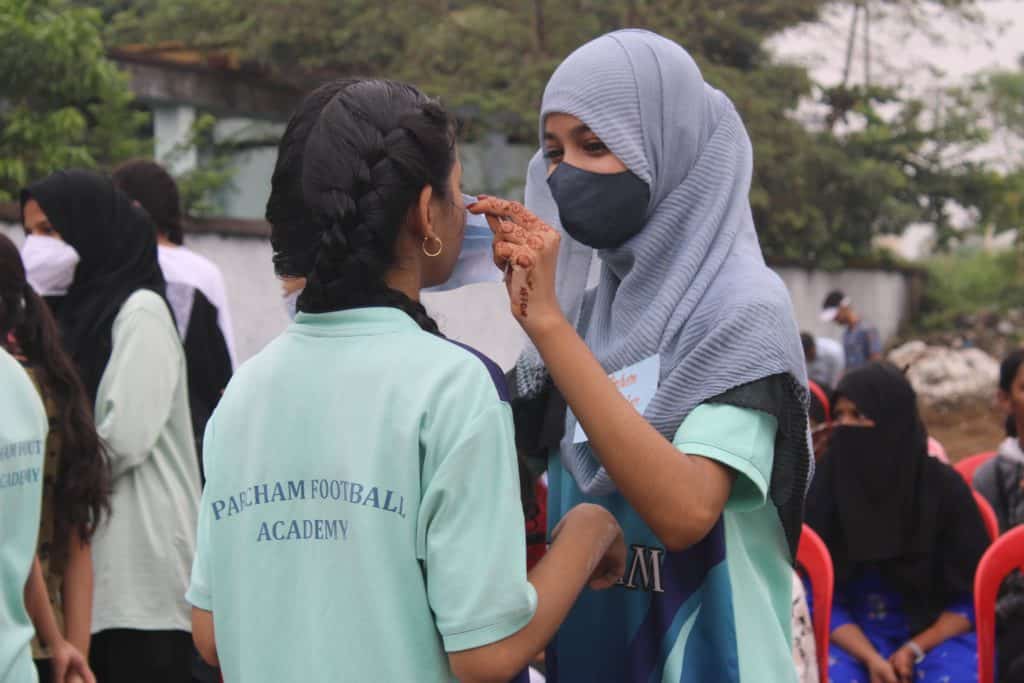
Sabah Khan helping a team member
Sabah believes in the power of football to unite across religion and culture. “In today’s climate of religious polarization, we want to use sports to build harmony,” she says.
By forming inclusive teams of Hindu and Muslim girls, Parcham breaks down barriers and nurtures understanding. “Football is a team sport,” she notes. “Playing together fosters friendship and mutual respect.”
In the early days, the first team had 40 girls—but most families didn’t even know their daughters were playing. “Some girls were so passionate they’d lie, saying they were going to study just to make it to practice,” Sabah says.
To address parental concerns, she introduced English classes alongside football training. This thoughtful gesture reassured families, who soon began actively supporting their daughters’ athletic pursuits.
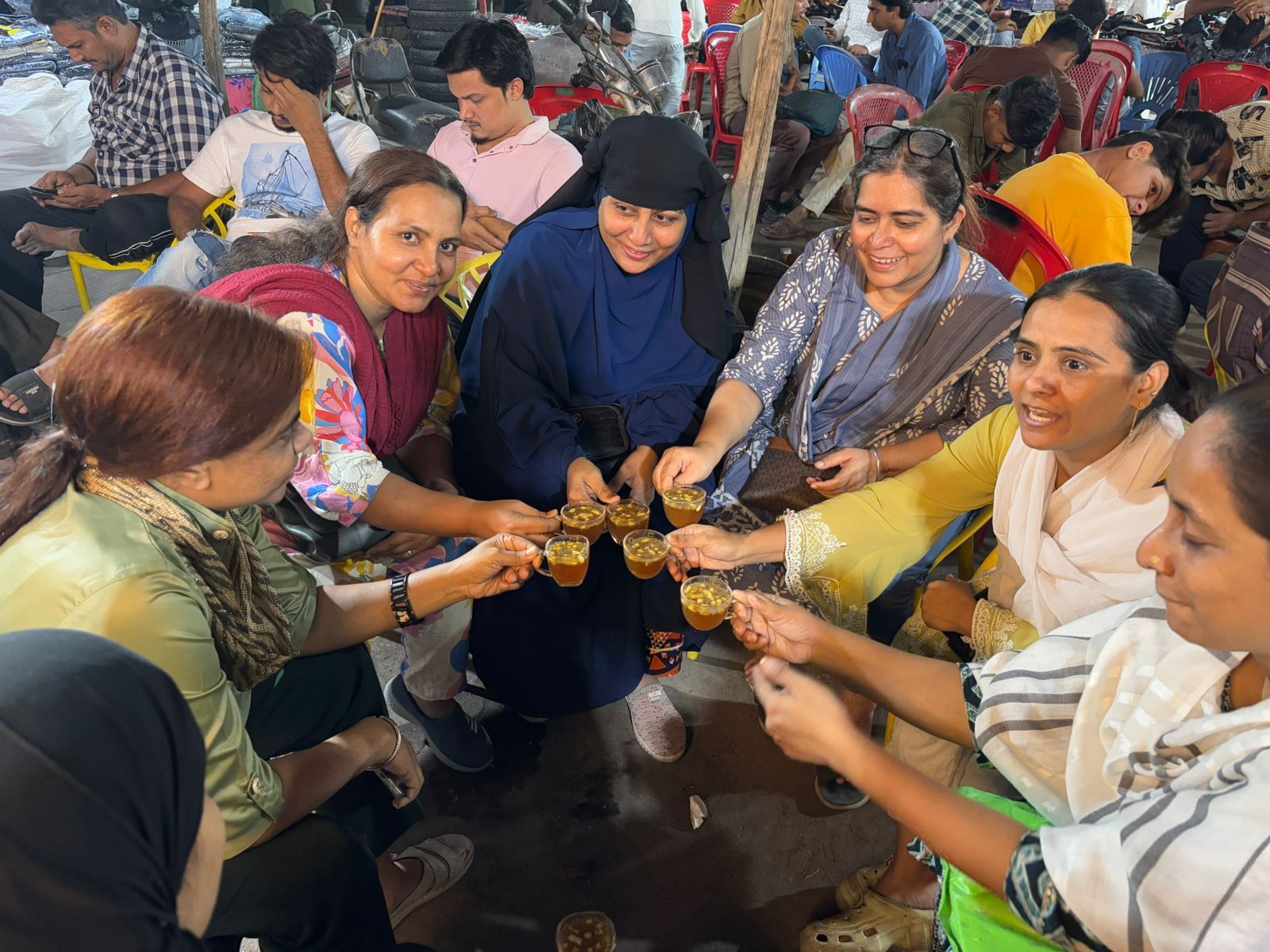 Sabah Khan with Parcham volunteers
Sabah Khan with Parcham volunteers
In India’s male-dominated society, especially in conservative communities, women in sports face deep-rooted resistance. Sabah met this head-on.
She documented these battles in her book Footballers of Parcham, which shares the real-life journeys of 12 Hindu and Muslim girls who defied social expectations to play football. Their stories stand as powerful testaments to resilience and courage.
One recurring concern was the attire of the players. “Many parents were uncomfortable with the girls wearing shorts,” Sabah says. “We never enforced a dress code. Whether in hijabs or traditional clothes, what matters is their participation.” This allowed girls from different states like Uttar Pradesh and Bihar to engage freely.
Understanding that sports alone aren’t enough, Sabah introduced programs to teach essential life skills—computer literacy, public speaking, and civic education.
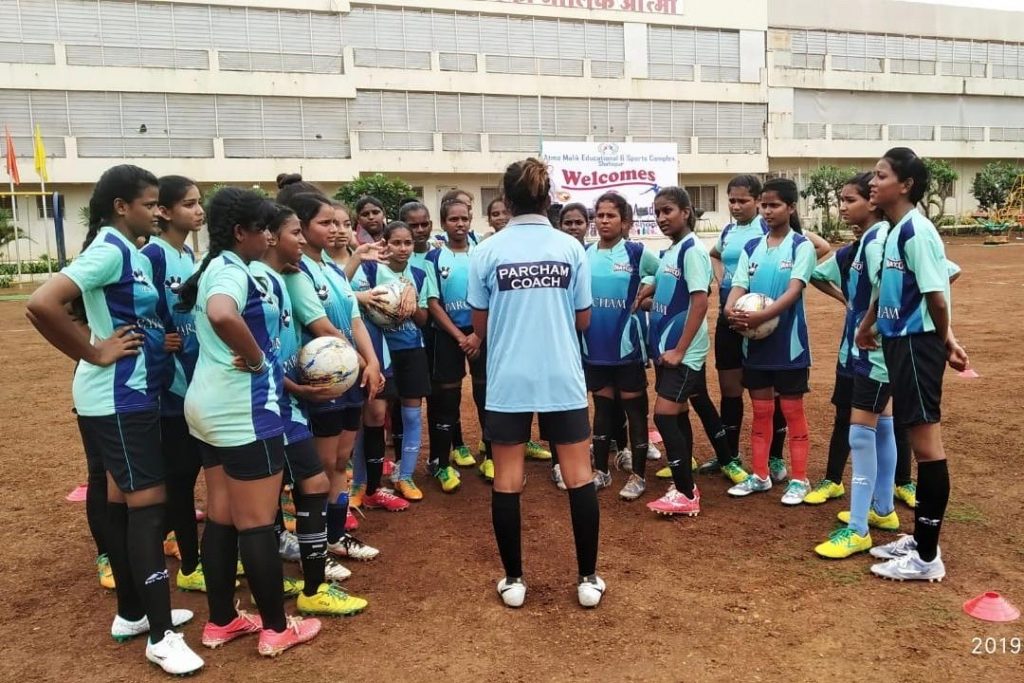 Sabah's Mumbra girls football team
Sabah's Mumbra girls football team
“In Mumbra, poverty often limits access to quality education,” she says. “Parcham teaches what schools often miss,” she adds. “We’re shaping confident, capable youth ready to lead.”
Through the Urooj initiative, which has run for six years, students meet political and social leaders to understand democracy, the Constitution, and their rights—empowering them to become informed, active citizens.
Sabah’s commitment extends to women’s empowerment through the Savitri-Fatima Foundation. She created Guftagu, a welcoming space where women can relax, connect, and access books, games, and entertainment.
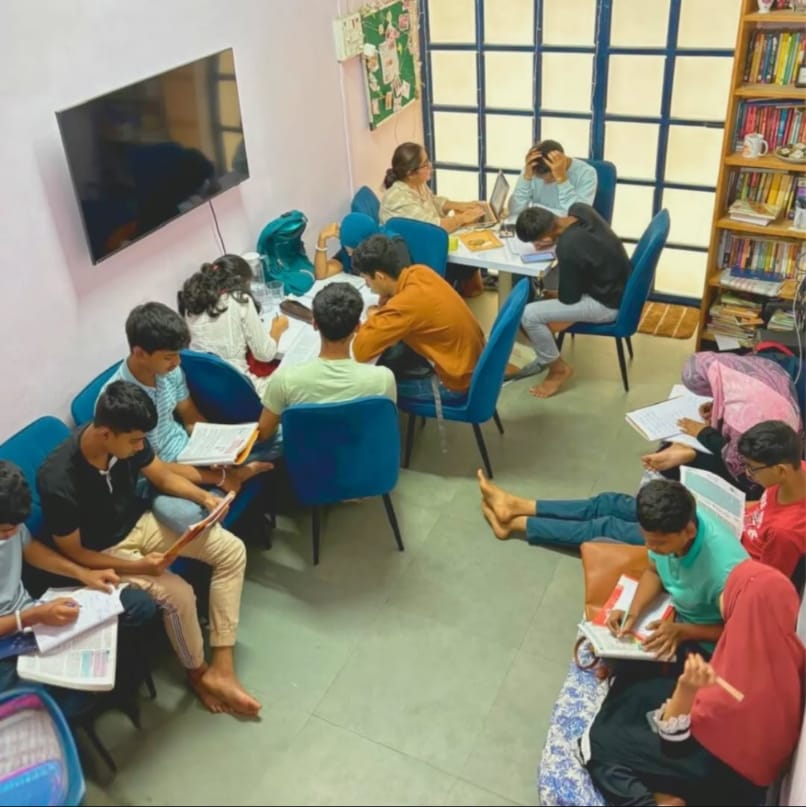 Sabah with her team mates
Sabah with her team mates
“Guftagu is like a second home,” Sabah says. “It’s where friendships are formed and women find strength in community.”
The foundation also promotes economic independence. Many Muslim women, restricted from working outside, are trained in skills like mehndi art, sewing, and bag-making. Their creations have even been sold at a Tata Institute stall—earning ₹22,000 in just two days.
Today, girls in Mumbra play confidently on the football field—some wearing hijabs, others in traditional attire—proving that ambition and culture can coexist.
More importantly, young men and women alike are joining Parcham’s movement, working alongside Sabah to create a more equal, inclusive community.
ALSO READ: Sarfaraz Ahmad is reviving cultural consciousness among Maharashtra Muslims
Through sport, education, and economic opportunity, Sabah Khan isn’t just changing lives—she’s redefining what’s possible.
